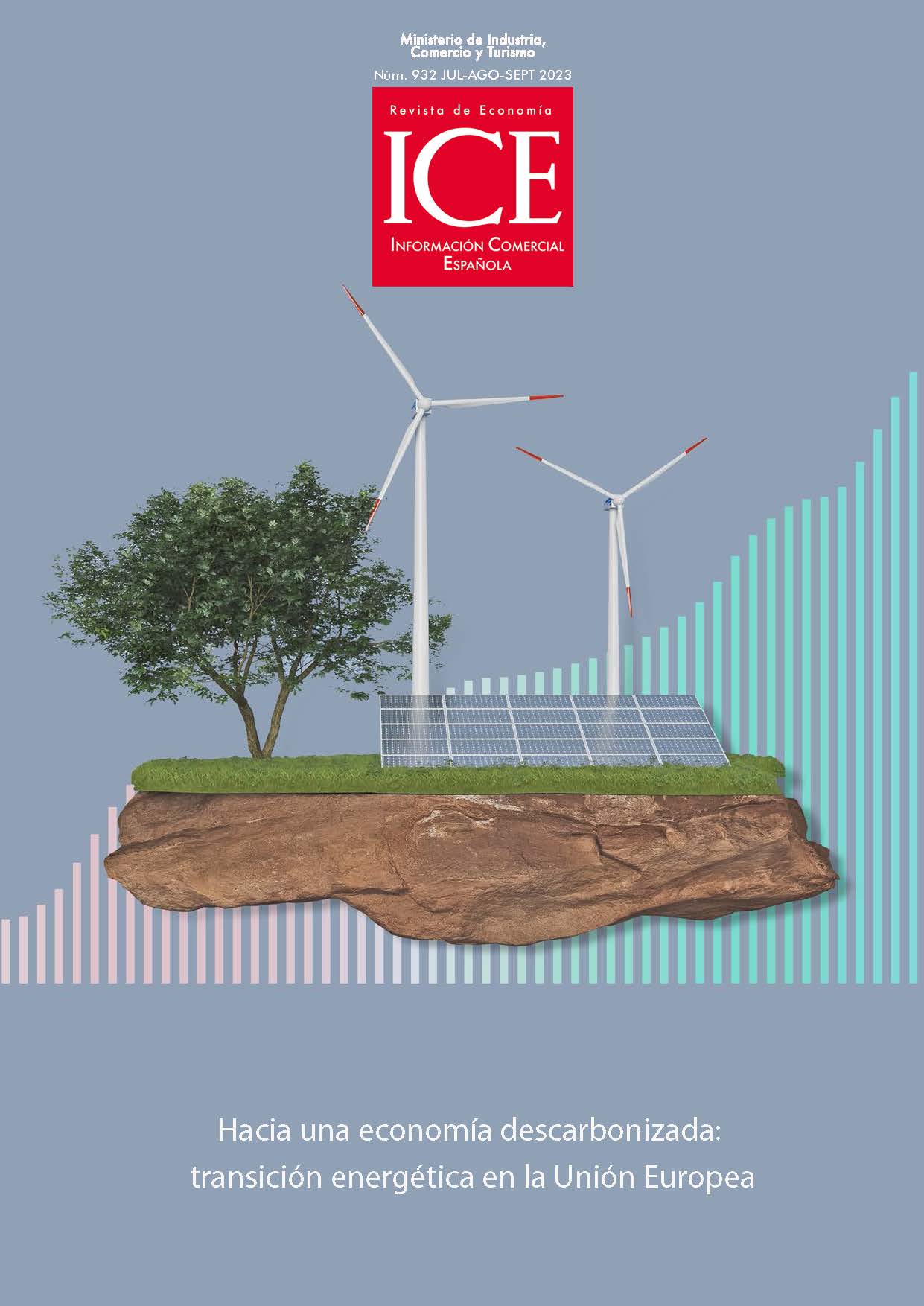Environmental taxation in Europe and Spain. Harmonisation, convergence and reforms
##plugins.themes.bootstrap3.article.sidebar##
Downloads
##plugins.themes.bootstrap3.article.main##
Faced with the challenge of the fight against climate change and the necessary energy transition, this article analyses recent trends in environmental taxation in the European Union (EU), with a special focus on Spain. A convergence analysis of the environmental tax burden reveals a lack of integration and harmonisation at EU level, although groups of countries with similar patterns of behaviour are identified. The results show the need to review environmental taxation at European level, improving the tax framework and harmonising regulation in a way that facilitates the achievement of climate objectives and commitments. In this context, and in coordination with the EU, Spain should strengthen environmental taxation with a comprehensive reform to make it effective in correcting negative externalities on the economy's natural capital.
##plugins.themes.bootstrap3.article.details##
- Miguel Cardoso, Giancarlo Carta, Rafael Doménech, Pilar Más, The economic consequences of the COVID-19 pandemic: sectoral and regional heterogeneity , ICE, Revista de Economía: No. 923 (2021): El impacto económico de la pandemia
Avgousti, A., Caprioli, F., Caracciolo, G., Cochard, M., Dallari, P., Delgado-Téllez, M., Ferdinanduse, M., Filip, D., Prammer, D., Schmidt, K., & Theofilakou, A. (2023). The climate change challenge and fiscal instruments and policies in the EU (ECB Occasional Paper No. 315). European Central Bank.
BBVA Research. (2022). Measuring the CO2 Footprint of European Households: A comprehensive approach.
Comisión Europea. (2003). Council Directive 2003/96/EC of 27 October 2003 restructuring the Community framework for the taxation of energy products and electricity. Official Journal of the European Union, 31.10.2003, L 283/51. https://commission.europa.eu/document/b8f6d84f-ca48-46b9-8bb9-e76a7ac53da4_es
Comisión Europea. (2021a). Communication from the Commission to the European Parliament, the Council, the European Economic and Social Committee and the Committee of the Regions. ‘Fit for 55’: delivering the EU’s 2030 Climate Target on the way to climate neutrality. COM(2021) 550 final. https://www.consilium.europa.eu/ en/policies/green-deal/fit-for-55-the-eu-plan-for-a-green-transition/#what y https://eur-lex.europa.eu/legal-content/ EN/TXT/PDF/?uri=CELEX:52021DC0550
Comisión Europea. (2021b). Proposal for a Council Directive restructuring the Union framework for the taxation of energy products and electricity (recast). COM(2021) 563 final. https://eur-lex.europa.eu/legal-content/EN/TXT/ HTML/?uri=CELEX:52021PC0563&from=en
Comisión Europea. (2021c). Proposal for a Directive of the European Parliament and of the Council amending Directive (EU) 2018/2001 of the European Parliament and of the Council, Regulation (EU) 2018/1999 of the European Parliament and of the Council and Directive 98/70/EC of the European Parliament and of the Council as regards the promotion of energy from renewable sources, and repealing Council Directive (EU) 2015/652. COM(2021) 557 final.
Comisión Europea. (2022). Communication from the Commission to the European Parliament, the European Council, the Council, the European Economic and Social Committee and the Committee of the Regions. REPowerEU Plan. COM(2022) 230 final.
Cubero, J. J., Más, P. y Pou, V. (2022). Fiscalidad medioambiental en España. BBVA Research. https://www.bbvaresearch.com/wp-content/uploads/2022/01/Observatorio_Fiscalidad-medioambiental_vf.pdf
Delgado, F. J., Freire-González, J., & Presno, M. J. (2022). Environmental taxation in the European Union: Are there common trends? Economic Analysis and Policy, 73, 670-682. https://doi.org/10.1016/j.eap.2021.12.019
European Court of Auditors. (2022). Review 01/2022: Energy taxation, carbon pricing and energy subsidies. https://www.eca.europa.eu/Lists/ECADocuments/RW22_01/RW_Energy_taxation_EN.pdf
Fetting, C. (2020). The European Green Deal. European Sustainable Development Network (ESDN), December.
Flues, F., & Thomas, A. (2015). The distributional effects of energy taxes (OECD Taxation Working Papers No. 23). Organisation for Economic Co-operation and Development. https://doi.org/10.1787/5js1qwkqqrbv-en
Gago, A., Labandeira, X., Labeaga, J. M. y López-Otero, X. (2019a). Impuestos energético-ambientales en España: situación y propuestas eficientes y equitativas (Documento de Trabajo de Sostenibilidad n.º 2). Fundación Alternativas y Fundación Iberdrola España.
Gago, A., Labandeira, X., Labeaga, J. M. y Lopez-Otero, X. (2019b). Impuestos energético-ambientales, cambio climático y federalismo fiscal en España. Ekonomiaz. Revista vasca de Economía, 95(1), 275-290.
IMF. (2022). Canada: Article IV Consultation-Press Release; and Staff Report. International Monetary Fund Country Report No. 22/361.
Instituto de Estudios Fiscales. (2022). Libro Blanco sobre la Reforma Tributaria. Ministerio de Hacienda y Función Pública.
IPCC. (2023). AR6 synthesis report: Climate change 2023. Intergovernmental Panel on Climate Change.
Ministerio de Hacienda y Función Pública. (2022). Estudio sobre el impuesto especial sobre determinados medios de transporte y sobre el impuesto de vehículos de tracción mecánica.
Phillips, P. C. B., & Sul, D. (2007). Transition modeling and econometric convergence tests. Econometrica, 75(6), 1771-1855. https://elischolar.library.yale.edu/cgi/viewcontent.cgi?article=2887&context=cowles-discussion-paper-series
Phillips, P. C. B., & Sul, D. (2009). Economic transition and growth. Journal of Applied Econometrics, 24(7), 1153-1185. https://onlinelibrary.wiley.com/doi/10.1002/jae.1080


